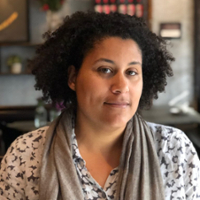2023-24 Elizabeth D. Rockwell Center on Ethics and Leadership Faculty Fellows:
 Rachel Quinn, Translation of her 2021 book Being La Dominicana: Race and Visual Culture in Santo Domingo (Illinois University Press, 2021), into Spanish.
Rachel Quinn, Translation of her 2021 book Being La Dominicana: Race and Visual Culture in Santo Domingo (Illinois University Press, 2021), into Spanish.
Being La Dominicana involved more than a decade of support and engagement from numerous Dominican friends and acquaintances, and more than forty interviewees. A Spanish translation will make it accessible to Dominicans as well as their broader networks worldwide, and additional readers in Latin America and in Spain. As the book was written in a way that would be appealing to undergraduate readers, the hope is that a translation will also make the book available to larger numbers of such readers to inspire tolerance about race and gender in the Caribbean.
 Valerie Koch, “Reimagining Informed Consent.”
Valerie Koch, “Reimagining Informed Consent.”
The legal doctrine of informed consent represents one of the most widely accepted attempts to enshrine ethical principles into law. In an effort to ensure autonomous, voluntary, and informed decision making in medicine, the courts in two seminal legal cases, Canterbury v. Spence and Cobbs v. Grant, sought to center the patient, by requiring that the physician disclose all information that a reasonable person in the patient’s position would consider material to her decision making. However, those efforts, while laudable, have proven wholly inadequate to achieving the ethical principles they were intended to achieve. The legal doctrine’s singular focus on the adequacy of physician disclosures emphasizes ritual over relationships, leading physicians to assume more disclosure is better for the purposes of preventing liability. This results in informed consent becoming a facet of defensive medicine.
This project introduces a new standard for informed consent based on patient comprehension and consent, rather than just physician disclosure. This proposal represents a dramatic transformation of the common law and medical practice, the latter of which has conformed to the disclosure-focused in doctor-patient interactions mandated by the law. The project has three main aims. First, it involves a deep analysis of the tools and techniques for assessing and assuring comprehension, in order to identify those tools that are most effective for measuring understanding. Second, because this proposal is not a natural extension of organic developments in informed consent law, it includes draft model language for a new legal doctrine of informed consent: one that incorporates a subjective standard for patient comprehension. This language can serve as a template for judges and legislators upon which to rely in efforts to improve medical decision making. Finally, this project will examine the potential for this proposal to ameliorate some of the inequities that are endemic to the informed consent process.
This project has the potential to transform the legal doctrine of informed consent to align the ethical goals of informed consent with the legal rules that govern it.